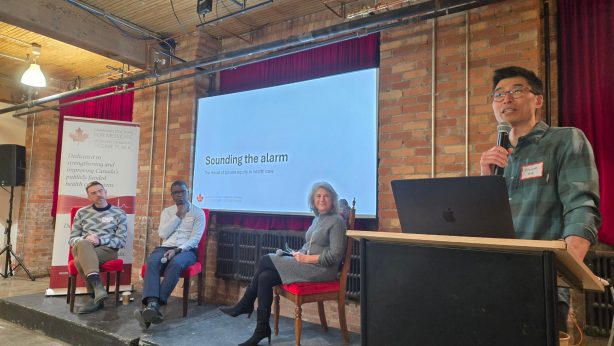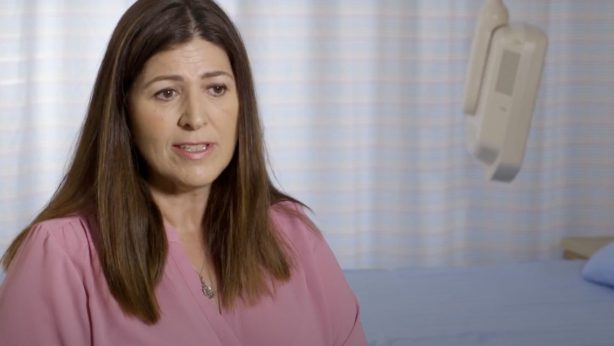Enforce Canada Health Act and ensure access to care: Canadian Medical Association to governments
This week’s edition of who is saying what about public health care is compiled by Pat Van Horne.
Canadian Medical Association says for-profit care not the way to go
“Health care should not privilege those who can afford to pay for services… This updated policy is really rooted in the values that we heard the most,” said Dr. Kathleen Ross, co-president of the Canadian Medical Association, to the Toronto Star, July 30, 2024. According to the Star, the Canadian Medical Association is calling for an end to “the practice of patients being charged membership fees or bundled payments to gain access to primary care covered by universal health care.”
“The voice of Canadian doctors is clear: the debate is settled and privatization will not solve problems in the health-care system,” said Dr. Melanie Bechard, pediatric emergency physician in Ottawa and chair of Canadian Doctors for Medicare, to the Toronto Star, July 30, 2024
Ottawa vs provinces: who pays for ‘virtual’ care?
“Ottawa recently warned the provinces that they would have to pay for all virtual care, which includes care paid for by companies, even if it is provided by a nurse or from another province. . .Tensions between the federal government, the provinces and some lobbies in the insurance sector were fairly predictable, given the increased use of telemedicine since the pandemic and the absence of a clear and coherent framework. They are linked to federal Health Minister Mark Holland’s intentions . . .to modernize the interpretation of the Canada Health Act (CHA). The aim is to prevent patients from having to pay for ‘medically necessary care’ when that care would normally have been covered under a public plan if it had been provided in-person by a physician. . . It may be, as the Romanow Commission recommended more than 20 years ago, that a new Canada Health Act might be needed to deal with the current issues of access to care, and not just a new interpretation, which would be limited in scope,” according to Marco Laverdière, lawyer and associate researcher at the Canada Research Chair on Collaborative Culture in Health Law and Policy and at the H-POD of the Université de Montréal, in Policy Options, July 29, 2024
Manitoba unclear on doctor recruitment: Winnipeg Free Press
“The province should be open and transparent about what it is willing to offer physicians financially to work in Manitoba… Like Manitoba, most provinces are experiencing a shortage of health care professionals. The last thing Canada needs is for provinces to be aggressively poaching health care workers from each other. . .At the same time, it’s important that Manitoba offers front-line health care workers, including physicians, competitive salaries,” wrote the Winnipeg Free Press in an editorial, July 30, 2024
Meanwhile, health care going to the people via Mobile Health Care Clinic in Winnipeg
“We’re really lucky to have really incredible partners … who are willing to step up and meet the needs of folks in community… As a government, any time that we can get behind those kinds of efforts and work together to make health care better and make health better in our communities, that’s what we should be doing,” said Manitoba Health Minister Uzoma Asagwara, Winnipeg Free Press, July 29, 2924
Saskatchewan health care workers still getting short end of the pay stick through faulty pay system
“Our members are missing hundreds, even upwards of a thousand dollars in some cases, on their paycheques, and that is unacceptable. The system is set up in such a way that when there’s a problem with your pay you create a ticket. . .Sometimes they respond — but it’s usually two weeks, three weeks and people are not getting paid and they’re not getting any response. . . There are cases where somebody was short $1,088 and, when we raised that issue with the employer, all they did was send a $375 cheque to them,” said Bashir Jalloh, president of Canadian Union of Public Employees Local 5430, Global News, July 29, 2024
Rural health care a challenge in Northern Ontario
“I know we provide good care with what resources we have and I hesitate and worry about what will happen if if something changed and we weren’t here… Who do I send out for higher levels of care?… Who do I send out for more imaging? Because I know that that takes resources away from here. And the only ambulance that’s on will be taking our patient and be gone for three hours. So that means if someone in town calls 911, it’s going to be a long time… that’s a big weight on me deciding who gets to go where and when,” said Dr. Amy Vine, Blind River ON Hospital, to CBC News, July 30, 2024
Indigenous woman’s family wants accountability for death in care
“I think if somebody had really listened to her or took their job very seriously, I think she would be alive and here with us today,” said Jordan Quequish, on the first day of an inquest into the 2017 death of his sister, Ruthann Quequish, to The Canadian Press/Global News, July 29, 2024
Labrador hospital attracting rural doctors
“It’s not just the nine-to-five … it’s also the community, it’s also the coast… So that’s part of building an attraction to the place… We send the first-year residents off to the Innu gathering and they spend a week on the land with some of the first people in this area… Some of the elders will come and teach us about what it was like to grow up on the land,” said Dr. Robert Forsey, to CBC News, July 27, 2024
Debate over powers to pharmacies
“It’s fiddling around the edges… a band aid solution for a health care system in crisis… (potential) serious consequences for patients (if misdiagnosed in a pharmacy),” said Dr. Dominik Nowak, family physiciana at the Women’s College Hospital, to the Toronto Star, July 25, 2024
Support the Canadian Health Coalition



